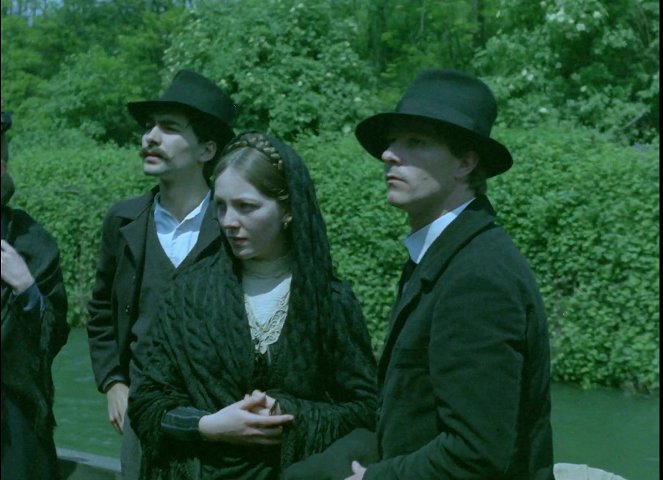Rendező:
Ermanno OlmiForgatókönyvíró:
Ermanno OlmiOperatőr:
Ermanno OlmiSzereplők:
Luigi Ornaghi, Francesca Moriggi, Omar Brignoli, Antonio Ferrari, Teresa Brescianini, Giuseppe Brignoli, Carlo Rota, Pasqualina Brolis, Massimo Fratus (több)Tartalmak(1)
In Italy at the beginning of the Last century there are many poor families living on farms. One of these families has a clever child who they sent to a nearby school. He has to walk every day but one day he breaks his shoes. Where can they get another pair from? (forgalmazó hivatalos szövege)
Recenziók (3)
I approached The Tree of Wooden Clogs with skepticism. In 1978, it won the Golden Palm at the festival in Cannes, where the most snobbish people in the world, concentrated in one square kilometer, gather. That is a sufficient warning for an observer who knows something about the self-centeredness of the festival scene. My instincts did not disappoint me. Olmi could have been considered the inventor of the genre of fictional documentaries in the 70s, which is now so popular and widely used. He dedicated maximum energy to creating authenticity in capturing the lives of villagers in the Italian region of Lombardy. He worked with non-actors from the area in order to perfectly capture the local dialect. The film depicts the lives of five farming families living collectively on a farm and renting land from a landlord. However, comparisons to modern fictional documentaries are unfortunately not appropriate. They were created to make the documentary genre more attractive, lively, and accessible to viewers. They work with editing and professional actors, similar to entertaining fictional films. The downfall of Olmi's experiment lies in the fact that he works in real time, therefore it is very slow and, in my opinion, annoying and boring due to its murderous length. Olmi goes as far as the phenomenon of so-called slow TV today, which is completely beyond the scope of my interests. I know of three-hour films where the viewer doesn't have enough time to realize the long duration, and I know ones that subjectively last twice as long. Unfortunately, I would place The Tree of Wooden Clogs in the second category. Overall impression: 25%.
()
In a sensitive and peaceful spirit, Olmi reconstructs the vanished Europe divided between the agrarian and industrial eras, with factories and the world that comes with them only vaguely and somewhat ominously outlined on the horizon for our protagonists. Today's Europeans can only imagine what it was like when countless estates, mills, fields and gardens, churches, roads, and paths were scattered throughout the countryside, where people worked and lived at an unchanged pace for generations. However, idealization is not appropriate (and credit to the director for not forcing it into the film) – people suffered from the injustice of the social order, were held captive by superstition, they certainly did not reject profit and money, and work was mainly seen as a duty. Yet what can be done when they did everything in their lives with such simple sincerity that no one has today?!
()
I didn't think I would like this movie, but the way the rural life is captured here is something that only a few have managed to achieve. It's touching, it's powerful, it's slow, but at the same time, there is always something happening, which is mainly due to the excellent editing - don't expect a static camera here. I don't admire Italian cinema of this period as a whole, but this film, yes.
()

